17 Jul 2023
Five ways Fairtrade promotes youth inclusion in global supply chains
By: Kelly Hawrylyshyn, Head of Global Resource Mobilisation, Fairtrade International
Farming communities around the world face a major challenge: the next generation exiting farming altogether.
For younger people, a future in farming could mean earning a decent living, an opportunity to introduce modern techniques and revolutionize farms passed down through generations, or a way to help to preserve the environment. The reality, unfortunately, is often quite different.
Young people see their parents’ daily struggles and many times associate farming with poverty and an unfair return on investment. Rural livelihoods remain a discouraging prospect for most young people, many of whom migrate to the big cities or abroad in search of decent work.
But the next generation is key in ensuring the future sustainability of small-scale agriculture. According to Fairtrade monitoring data, the average age of farmers is 55, and if farming does not become an attractive prospect for the generations to come, the problems already being faced by global food systems will aggravate. Here are five ways Fairtrade works with the next generation of farmers:
1. Access to education
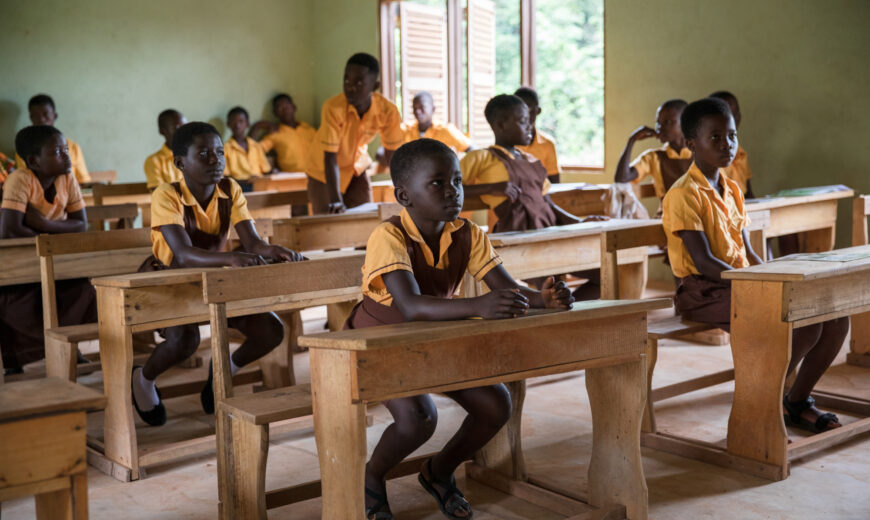
Fairtrade producers decide for themselves how to spend the Fairtrade Premium - the extra money they earn by selling on Fairtrade terms - and often target education. In 2020, they invested more than €190 million of their Premium funds into SDG4 (quality education) - that’s 35 percent of the Fairtrade Premium in co-ops and 23 percent in hired labour organisations.
Investment in education ranges from building schools, buying supplies and uniforms, providing bursaries, and transporting students to and from school. The three regional Fairtrade Producer Networks also provide equitable access to training and informal education, supporting young people to boost their future livelihood opportunities.
In addition, there are also specific programmes focusing on agriculture, leadership and climate. For example the Climate Change Leadership School in Ecuador.
Fairtrade works with thousands of schools and teachers, providing Fairtrade classroom materials about where food comes from and how it's made, as well as crucial development challenges including climate change and gender equality. More than a thousand Fairtrade schools and universities in 23 countries are engaged in campaigns promoting SDG12 (sustainable consumption and production), such as the inspiring Fairtrade schools awards in the UK.
2. Entrepreneurship
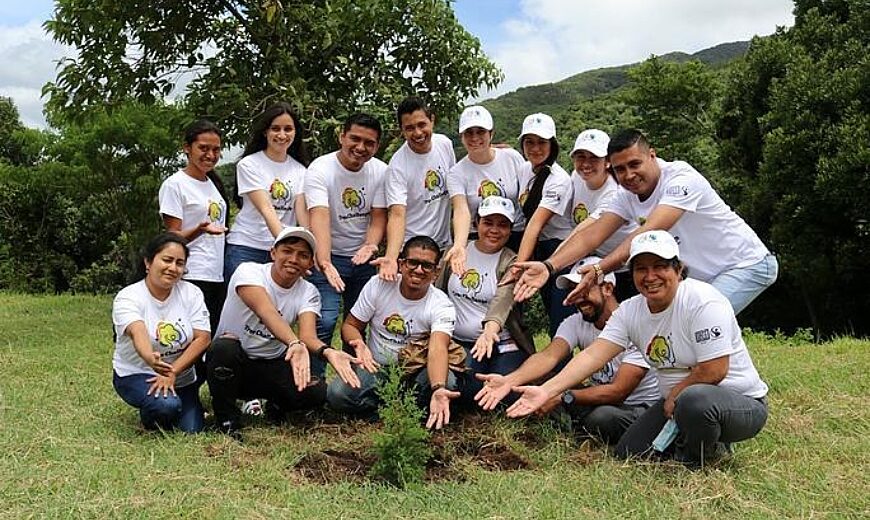
Fairtrade supports young producers - both women and men - to gain the leadership and financial management skills to improve productivity, effective management, and inclusive resilience. Young people on Fairtrade certified co-ops are also being trained in dynamic agroforestry, agro-ecology and nature conservation - skills which will equip them to act as environmental champions and to encourage others.
At the Colombian coffee co-op Red Ecolsierra, for example, young people are driving the organisation’s EcoTourism diversification initiative. They lead guided tours to the fields of coffee farmers in the Sierra Nevada de Santa Marta, showcasing coffee production as well as the gastronomic, natural and cultural attractions of the area – the highest coastal mountain in the world. Book your next holiday and get to meet these amazing youth entrepreneurs!
3. Added value
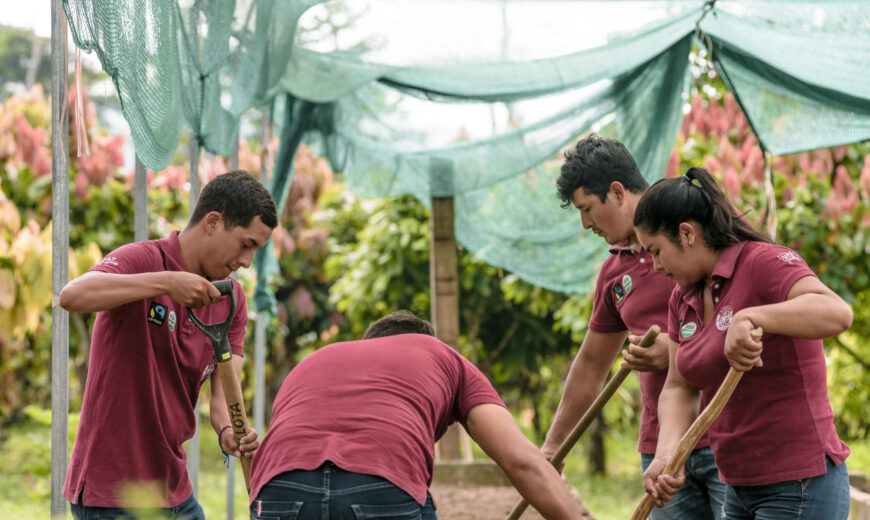
Fairtrade programmes support young people to diversify livelihood opportunities in their communities and, in doing so, to secure intergenerational farming sustainability. Initiatives include carbon credits to invest in climate adaptation; training young people to set up sustainable agribusinesses, incubation and innovation hubs and disruptive technologies; the production and sale of organic fertilisers; and marketing and adding value. Once they have the skills and resources required, young people can apply new technologies to improve productivity and the quality and marketing of their products.
Fairtrade coffee co-ops have invested in quality cupping training for younger members, providing them with new expertise which benefits the whole organisation. Young producers are leading climate resilience measures, including switching to clean energy solutions such as solar panels for drying coffee and cocoa and energy efficient cookstoves. In Ethiopia, the Oromia cooperative, through Fairtrade’s carbon credit initiative, equipped 10,000 coffee farmers with fuel efficient cookstoves, helping to reduce carbon emissions by up to 70 percent.
4. Youth-led advocacy
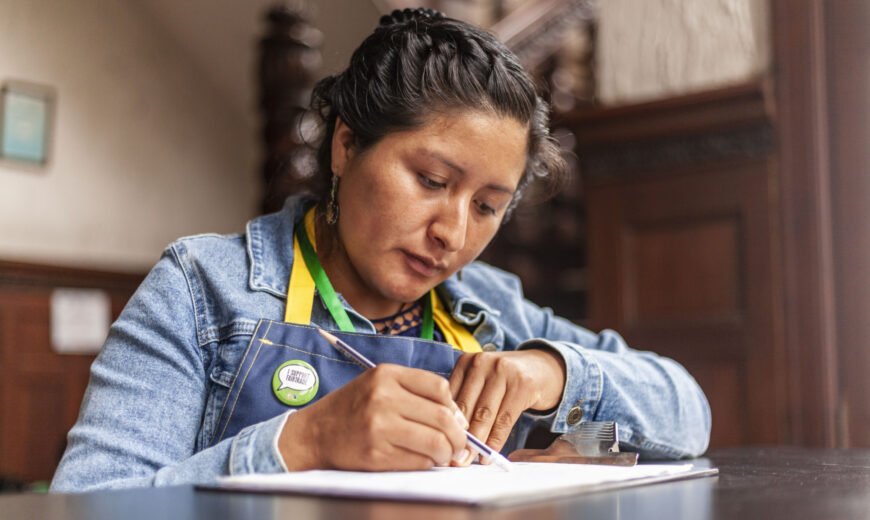
In 2022 the Fairtrade Ambassador Programme was launched to strengthen producer-led advocacy, comprising 15 young male and female producers, representing nine value chains in 13 countries. They learnt about EU and international policy, and how to influence policy for fairer trade by driving action on power imbalances in supply chains, inequality, human rights risks and climate change.
The Ambassadors are now participating in high-level debates, coming to the table as informed thought-leaders and sustainable food supply chain experts. They have already shared their expertise and experiences at UN climate COPs, the European Parliament and in national and local forums.
In the Philippines, for example, Fairtrade Ambassadors from sugarcane co-ops organised an awareness raising campaign for 400 elementary students and 19 teachers at Pandanon Elementary School in Negros Occidental under the slogan ‘Support local, choose Fairtrade, save farmers’. Following the successful event, the group in the Philippines grew from 15 to 80 Ambassadors, who are now actively engaging with local schools, faith-based organisations and communities through public mobilisation activities and social media campaigns. Meet the Fairtrade Youth Ambassadors here.
5. Youth inclusion in Fairtrade’s governance
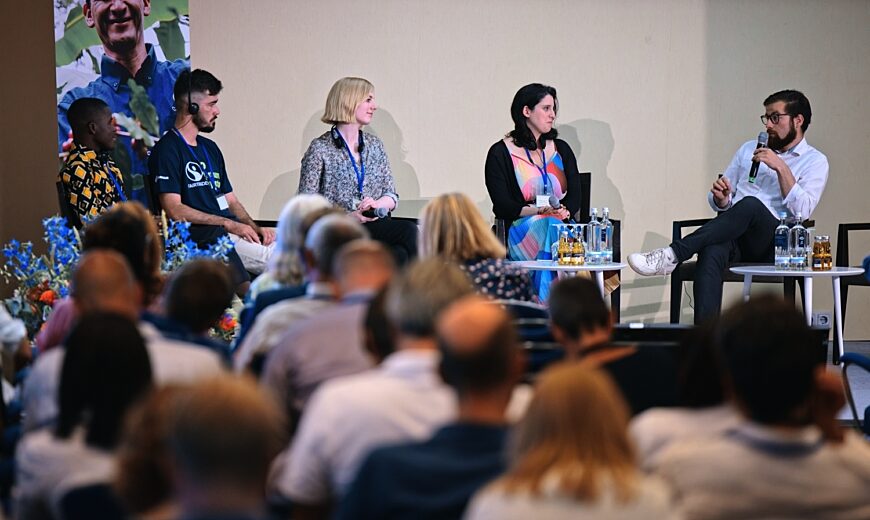
As part of Fairtrade’s contribution to SDG10 (reduced inequalities), we work with young people to help them become more active members of their co-ops. We encourage them to find new roles not only as entrepreneurs or youth ambassadors, but also within the leadership structures of their own organisations. The aim is to provide them with a more attractive and fulfilling future in farming.
Ana Laura Sayago, a 28 year old a honey producer from Argentina, is the youth representative on the Board of Fairtrade’s regional producer network in Latin America and the Caribbean (CLAC). She is also a member of CLAC’s Gender and Inclusion Committee, and of the network of Argentine rural women in coordination with UN Women. The daughter of one of the founders of honey cooperative Coopsol, Ana Laura is active in the Bees for Hope project, aiming to preserve local and small-scale beekeeping and conserving local biodiversity. "It's definitely trickier as a young woman producer,” says Ana Laura. “I think I often work twice as hard as others to achieve respect and equality. But it is worth it, especially if it contributes to the visibility of marginalised groups in the world of work. We need more voices from marginalised groups in agriculture.”
We believe a more inclusive producer organisation is a win-win for young people and for Fairtrade itself, resulting in decent youth employment, skills development and business opportunities across agriculture value chains. Join us to ensure more young people in rural communities can thrive, by choosing Fairtrade certified products when you next go shopping.